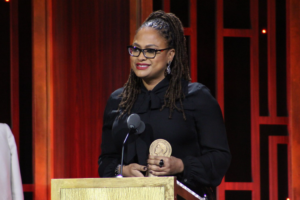
It’s no great secret that the film industry is rife with gender inequality, which shines through clearer than ever when it comes to recognition and representation during awards season. In 2018 especially, the entertainment industry has proven to be so key in sparking conversations about diversity and inclusion – and thereby changing the status quo. The #TimesUp, #MeToo and #OscarsSoWhite movements were all globally noticed and brought into question the treatment of women at work everywhere. If the world’s most visible industry, filled with the world’s most popular people, is calling for change, that should set a precedence.
So, is a change of tides in the film industry happening fast enough? In short – no. The total number of women ever to receive the Academy Award for Best Director stands at a grand total of one – Kathryn Bigelow for The Hurt Locker, in 2010. Bigelow is in fact one of only four women to have even been nominated for the award, following Lina Wertmüller in 1976, Jane Campion in 1993, and Sofia Coppola in 2003.
The Celluloid Ceiling is an annual study by Martha M. Lauzen PhD, which has been tracking women’s employment in the film industry for 20 years. The study continues to show, year-on-year, that women make up around only 18% of directors, writers, producers, executive producers, editors, and cinematographers working on the 250 yearly top-grossing films. More worryingly, those figures haven’t changed much at all since 1998.
Female representation in film is lower now than it was in the 1930s. In 2018, fewer than half of the 89 films named best picture at the Oscars have passed a common measure of on-screen female representation known as the Bechdel Test. So named because of its origins in Alison Bechdel’s comic strip Dykes to Watch Out For, a movie passes the Bechdel Test if there are at least two named female characters that have a conversation with one another about something other than a man. This conversation needs to happen just once for it to pass.
As the Hollywood Film Awards take place tonight, with the Golden Globes just around the corner in early January, we wanted to celebrate some of the women leading the charge for change through their work in the industry – even if they won’t be rightly celebrated at the awards.
Greta Gerwig
A successful actress, writer and director, Gerwig received an Oscar nomination for Ladybird in 2017 – the first woman in history to do so on her directorial debut.
Ava Duvernay
Duvernay was the first black female director to be nominated for a Golden Globe, for Selma. The film’s nomination for an Oscar for Best Picture led to Duvernay becoming the first black female director to have her film nominated for an Academy Award.
Lone Scherfig
Scherfig’s film An Education saw her receive an Oscar nomination for Best Picture in 2010. She has been widely critically acclaimed for her other directorial outings, including Italian for Beginners and Wilbur Wants to Kill Himself.
Sofia Coppola
Coppola became the second woman ever to receive the Best Director award at the Cannes Film Festival, for The Beguiled in 2017. She previously won the Oscar for Best Original Screenplay for Lost in Translation in 2003, and became the third woman in history to be nominated for an Academy Award for Best Director.
Image credit: Photo by Stephanie Moreno/Grady College of Journalism and Mass Communications for Peabody Awards/University of Georgia





